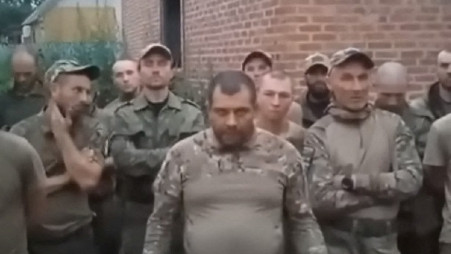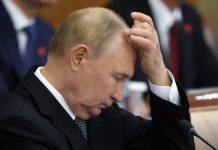They’re among hundreds of military and civilian offenders who’ve been pressed into Russian penal units known as “Storm-Z” squads and sent to the frontlines in Ukraine this year, according to 13 people with knowledge of the matter, including five fighters in the units.
“Storm fighters, they’re just meat,” said one regular soldier from army unit no. 40318 who was deployed near the fiercely contested city of Bakhmut in eastern Ukraine in May and June.
He said he’d given medical treatment to a group of six or seven wounded Storm-Z fighters on the battlefield, disobeying an order from a commander – whose name he didn’t know – to leave the men.
He said he didn’t know why the commander gave the order, but claimed that it typified how Storm-Z fighters were considered of lesser value than ordinary troops by officers.
The soldier, who requested anonymity because he feared prosecution in Russia for publicly discussing the war, said he had sympathy for the men’s plight: “If the commandants catch anyone with the smell of alcohol on their breath, then they immediately send them to the Storm squads.”
When contacted by Reuters, an officer at unit no. 40318 declined to comment on Storm-Z and ended the call. The Kremlin referred Reuters questions to the Russian defence ministry, which didn’t respond to a request for comment.
Russian state-controlled media has reported that Storm-Z squads exist, that they took part in intense battles and some of their members received medals for bravery, but it has not disclosed how they are formed, or the losses they take.
Reuters is the first news organisation to compile a comprehensive account of how the squads are put together and deployed, by speaking to multiple sources with direct knowledge of what is happening.
Like the soldier from unit no. 40318, the 13 people interviewed – who also include four relatives of Storm-Z members as well as three soldiers in regular units who interacted with the squads – all requested anonymity, citing fear of reprisals. Reuters verified the identities of all the fighters involved using criminal records, social media accounts, or by speaking to their fellow serviceman and their families.
The penal squads, each about 100-150 strong and embedded within regular army units, have typically been sent to the most exposed parts of the front and often sustain heavy losses, according to Reuters interviews with the people, who identified at least five Storm-Z teams fighting to repel a Ukrainian counteroffensive in the east and south.
Three of the five Storm-Z fighters interviewed by Reuters, and the relatives of three other Storm-Z fighters, described nightmarish engagements that saw much of their squads wiped out.
One fighter, with a conviction for theft who was recruited from prison, said all but 15 of the 120 men in his unit embedded with the 237th regiment were killed or wounded in fighting near Bakhmut in June.
The squads also combine convicts who volunteer to fight in exchange for the promise of a pardon with regular soldiers being punished for disciplinary breaches, the people interviewed said.
The Storm-Z squads are useful to the Russian defence ministry because they can be deployed as expendable infantry, according to Conflict Intelligence Team, an independent organisation that’s tracking the war. “The Storm fighters are just sent to the most dangerous parts of the front, in defence and in attack,” the group, which was founded in Russia, told Reuters.
While the Russian defence ministry has never acknowledged creating Storm-Z units, the first reports of their existence emerged in April when the Institute for the Study of War, a U.S.-based think-tank, cited what it said appeared to be a leaked Russian military report on the formation of the squads.
Reuters wasn’t able to determine how many soldiers in total are serving in the units, though the interviews with the people familiar with the matter point to at least several hundred Storm-Z fighters currently being deployed on the frontline.
Wagner had about 25,000 fighters engaged in the conflict, its late leader Yevgeny Prigozhin said at the time of his June mutiny.
President Vladimir Putin made reference to convicts fighting in the regular army on Friday. At a televised meeting with a small group of regular Russian servicemen, he said he was aware that two of their comrades, former prison inmates, had been killed in action. “They gave their lives for the motherland and have fully absolved themselves of their guilt,” said Putin, adding that the convicts’ families would be given help, without elaborating.
There is historical precedent for military offenders being pressed into fighting units; in 1942, when the Red Army was retreating from a Nazi advance, Soviet leader Josef Stalin ordered soldiers who panicked or left their posts into “punishment battalions” deployed to the most dangerous parts of the front, according to a decree he signed.
Ukraine’s government has said it also releases some convicts if they agree to fight in the war.
From Custody to Carnage
Storm-Z is an unofficial term used by Russian troops, combining a term for assault troops with the letter Z, adopted by the military as a symbol of their invasion of Ukraine.
Artyom Shchikin, a 29-year-old from the Mordovia region in central Russia, was serving a two-year sentence for robbery handed down in December 2021 when defence ministry recruiters came to his jail asking if inmates wanted to go and fight in Ukraine, according to court records and two of his relatives.
He signed up because, even though he was scheduled for release in December this year, he wanted to wipe clean his criminal record plus earn money so his family could renovate their home, his family members said. Three Storm-Z fighters said they were offered wages of about 200,000 roubles ($2,000) per month, though said they had been paid roughly half that amount, on average.
By May this year, Shchikin was assigned to a penal unit within the 291st Guards Motorised Rifle Regiment and deployed to the Zaporizhzhia region in southern Ukraine, where Kyiv’s forces are trying to break through Russian defences, the relatives added.
Vladimir Rogov, an official in the Russian-installed administration in Zaporizhzhia who gives regular online updates about the conflict, has posted on Telegram that the 291st regiment was fighting in the region throughout the summer. Rogov didn’t respond to a Reuters request for comment.
Shchikin’s relatives last heard from him on June 18.
Days later, his unit’s positions came under Ukrainian fire, the relatives said, citing conversations with two survivors from Shchikin’s squad. Three comrades who had been in a trench with him were killed, another had his hand torn off, while Shchikin himself is missing, the relatives said. His body hasn’t been recovered.
Shchikin’s relatives said when they asked the defence ministry for answers about his fate, it either didn’t respond or didn’t give any definitive answers.
“They were from a Storm unit. For them, no one is going to be in a rush,” said one relative.
Reuters was unable to independently confirm the relatives’ account of events.
Drunk on Duty, Using Drugs
While convicts form the core of the penal squads, some regular soldiers have been assigned to them as punishment for breaking discipline, according to two soldiers who said members of their units had been transferred in this way, as well as a Storm-Z fighter called Igor, a convict jailed for attempted murder.
The two soldiers, including the one from unit no. 40318, said officers had sent soldiers to Storm-Z for being drunk on duty, for using drugs, and for refusing to carry out orders.
According to Russian legislation on military discipline, a soldier can only be transferred to a penal unit if convicted by a military court. None of the people who told Reuters of soldiers being sent to Storm-Z said the men had participated in a court hearing.
Contacted last week, the soldier from unit no. 40318 said there were no court hearings involved in such transfers, and Igor, the Storm-Z fighter, said he had no knowledge of court hearings having taken place.
The Geneva convention, a set of international rules of war, doesn’t cover soldiers being punished by their own side.
Revolt of Storm-Z Fighters
One group of about 20 Storm-Z fighters in Zaporizhzhia, who were part of unit number 22179, decided they’d had enough of their treatment, refused an order to go back to the frontline, and recorded a June 28 video complaining about their treatment. Reuters called numbers listed for the unit, but they were out of operation.
“On the frontline, where we’ve been, we did not get deliveries of ammunition. We did not get water or food. The injured were not taken away: still now the dead are rotting,” said a fighter in the video, whom Reuters was unable to identify.
“We’re given dreadful orders that are not even worth carrying out,” he added. “We refuse to continue carrying out combat missions.”
The family member of one of the soldiers in the revolt, a man from Siberia who had volunteered to join Storm-Z from prison, said she dreaded news from the front.
“My God, let this end soon,” she said of the war.












